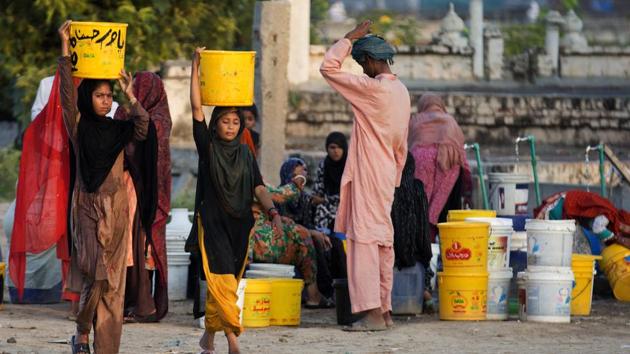50 million people in Pakistan’s Indus Valley at risk of arsenic poisoning: Study
Previous studies have found that there has been considerable arsenic contamination in other South and East Asian countries, for example, India, Bangladesh, Cambodia, and Vietnam.
Around 50 million people in Pakistan’s Indus Valley are at the risk of arsenic poisoning due to an “alarmingly high” level of contamination in water, a study has warned.

‘Extensive arsenic contamination in high-pH unconfined aquifers in the Indus Valley’ was published on Wednesday in the journal of Science Advances.
It said that using a new data set of nearly 1200 groundwater quality samples throughout Pakistan, the researchers created state-of-the-art hazard and risk maps of arsenic-contaminated groundwater.
Previous studies have found that there has been considerable arsenic contamination in other South and East Asian countries, for example, India, Bangladesh, Cambodia, and Vietnam, researchers said.
“We estimate that approximately 50 to 60 million people use groundwater within the area at risk, with hot spots around Lahore and Hyderabad,” it said.

The study further noted that this number is alarmingly high and demonstrates the urgent need for verification and testing of all drinking water wells in the Indus Plain, followed by appropriate mitigation measures.
It said that the hazard model indicates that much of the Indus Plain is likely to have elevated arsenic concentrations, although the rest of the country is mostly safe.
Unlike other arsenic-contaminated areas of Asia, the arsenic release process in the arid Indus Plain appears to be dominated by elevated-pH dissolution, resulting from alkaline topsoil and extensive irrigation of unconfined aquifers, although pockets of reductive dissolution are also present.
It also reported that arsenic-contaminated aquifers are currently estimated to affect 150 million people around the world.
“However, the full extent of the problem remains elusive. This is also the case in Pakistan, where previous studies focused on isolated areas,” it said.
Lubna Bukhari of government-run Council for Research in Water Resources said that arsenic contamination was a major concern.
“We are trying to address the issue by providing anti- arsenic filter to villagers in areas badly hit by the menace,” she said.
Arsenic is naturally occurring and kills human cells causing skin lesions, organ damage, heart disease and cancer. There is no cure for arsenic poisoning.



